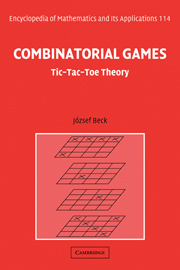Book contents
- Frontmatter
- Contents
- Preface
- A summary of the book in a nutshell
- PART A WEAK WIN AND STRONG DRAW
- PART B BASIC POTENTIAL TECHNIQUE – GAME-THEORETIC FIRST AND SECOND MOMENTS
- PART C ADVANCED WEAK WIN – GAME-THEORETIC HIGHER MOMENT
- PART D ADVANCED STRONG DRAW – GAME-THEORETIC INDEPENDENCE
- Appendix A Ramsey Numbers
- Appendix B Hales–Jewett Theorem: Shelah's proof
- Appendix C A formal treatment of Positional Games
- Appendix D An informal introduction to game theory
- Complete list of the Open Problems
- What kinds of games? A dictionary
- Dictionary of the phrases and concepts
- References
PART C - ADVANCED WEAK WIN – GAME-THEORETIC HIGHER MOMENT
Published online by Cambridge University Press: 06 July 2010
- Frontmatter
- Contents
- Preface
- A summary of the book in a nutshell
- PART A WEAK WIN AND STRONG DRAW
- PART B BASIC POTENTIAL TECHNIQUE – GAME-THEORETIC FIRST AND SECOND MOMENTS
- PART C ADVANCED WEAK WIN – GAME-THEORETIC HIGHER MOMENT
- PART D ADVANCED STRONG DRAW – GAME-THEORETIC INDEPENDENCE
- Appendix A Ramsey Numbers
- Appendix B Hales–Jewett Theorem: Shelah's proof
- Appendix C A formal treatment of Positional Games
- Appendix D An informal introduction to game theory
- Complete list of the Open Problems
- What kinds of games? A dictionary
- Dictionary of the phrases and concepts
- References
Summary
Here is a nutshell summary of what we did in Part A: the goal of the first chapter was to introduce the basic concepts such as Positional Game, Weak Win, Strong Draw, and to demonstrate the power of the potential technique on several amusing examples. The goal of the second chapter was to formulate the main results such as Theorem 6.4 and Theorem 8.2 (“exact solutions”), and also the Meta-Conjecture, the main issue of the book.
Part B was a practice session for the potential technique.
In the forthcoming Parts C–D, we discuss the most difficult proofs, in particular the exact solutions of our Ramseyish games with 2-dimensional goals. Part C is the building part and Part D is (mainly) the blocking part.
In Part A, we introduced two simple “linear” criterions (Theorem 1.2 and Theorem 1.4), and gave a large number of applications. Here, in Part C, we develop some more sophisticated “higher moment” criterions. The motivation for “higher moment” comes from Probability Theory. The “higher moment” criterions are applied in a way very similar to how some of the main results of classical Probability Theory – such as the central limit theorem and the law of the iterated logarithm – are all based on higher moment techniques.
Note in advance that the last part of the book (Part D) also has a strong probabilistic flavor: Part D is about how to “sequentialize” the global concept of statistical independence.
- Type
- Chapter
- Information
- Combinatorial GamesTic-Tac-Toe Theory, pp. 305 - 306Publisher: Cambridge University PressPrint publication year: 2008



